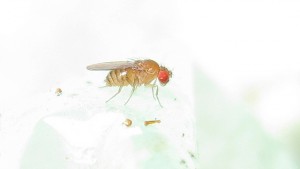New research from UC Berkeley sheds light on how our bodies respond to food, making room for more when it is available and shrinking the gut when food is scarce.
Researchers investigated how stem cells in the gut of the fruit fly respond when different amounts of food are present. They found that when food is abundant, stem cells in the gut divide more rapidly, increasing the size of the gut as long as food continues to be available. When food is removed, the cells stop dividing and the gut shrinks down again.
“The real surprise was that the fruit fly intestine is capable of secreting its own insulin,” said principle investigator David Bilder in a press release. “This intestinal insulin spikes immediately after feeding and talks directly to stem cells, so the intestine controls its own adaptation.”
Insulin is also the primary signaling molecule for converting blood sugar into usable energy in muscles, and storing it as fat.

